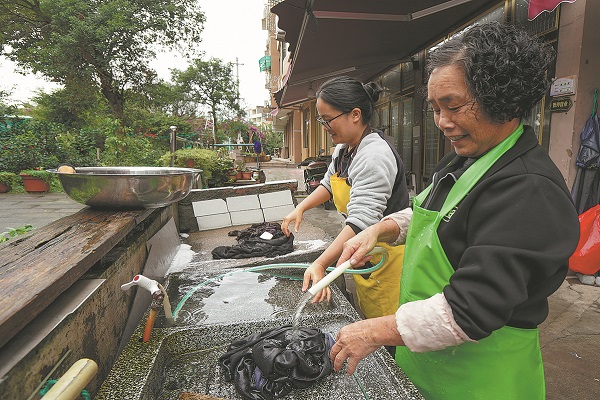Water supplies expand into remote areas
時間:2024-03-14 16:04:37 來源 : DiscoverWenzhou 作者 : Hou Liqiang
With 90 percent of its rural population already having access to tap water, China will strive to ensure such safe drinking water reaches one-fifth of the remaining rural residents this year, even though most of them live in sparsely-populated areas where water is scarce, the Ministry of Water Resources said.

China saw rural water coverage reach 90 percent at the end of last year, meaning that the country beat its target of increasing the proportion to 88 percent two years earlier than planned, said Xu Dezhi, deputy director-general of the ministry's department of rural water and hydropower.
He said the achievement follows the ministry's endeavors to integrate urban and rural water supplies while promoting both large and small rural water supply systems in light of local conditions.
The ministry has prioritized extending existing urban water networks to rural residents and building centralized water facilities that supply over 1,000 metric tons of water or serve 10,000 people every day, he said.
Under the ministry's guidance, local water resources authorities have sought more support from government budgets, issued special bonds and turned to bank loans and private capital to raise funds, he said.
A record high investment of 147 billion yuan ($20.4 billion) was made across the country last year, of which bank loans and private capital contributed almost 50 percent, he said.
Xu vowed tailored measures to expand rural tap water coverage.
The last 10 percent of rural residents without access to tap water are mainly from mountainous, pasturing and alpine areas, he said.
"With low precipitation, such places suffer severe water scarcity," he said.
The harsh natural conditions in these places, which usually feature huge mountains and deep ravines, make diverting water challenging, he said. The sparse populations mean the cost of building tap water facilities is quite high.
He said the ministry will hammer out a technical guideline as it promotes standardized construction and renovation of small water projects, which will be equipped with facilities for water purification and disinfection.
"We will ensure that not a single household and person in these areas will be left out," he stressed.
The ministry will make intensified efforts to enhance the management of such projects, he added. While bringing rural water supply facilities under unified management systems in each county, monitoring work will be strengthened to ensure water quality.
Xu identified the construction of county-level emergency water systems as another priority of the ministry to beef up safe rural water supply.
Counties will be required to set up emergency teams, stockpile emergency supplies and establish emergency water intake points, he said.
"We will make consistent efforts to improve the mechanisms to identify and handle problems that emerge in rural water supply," Xu said."A mechanism for follow-up checks will also be upgraded to ensure that all the problems can be addressed in a dynamic manner."(Hou Liqiang)

5f2a40b5-3abc-487f-ac12-50e75a8d67fb.jpg)
dba0fcf6-c53e-4f5b-b1cf-556dc8c16e15.png)